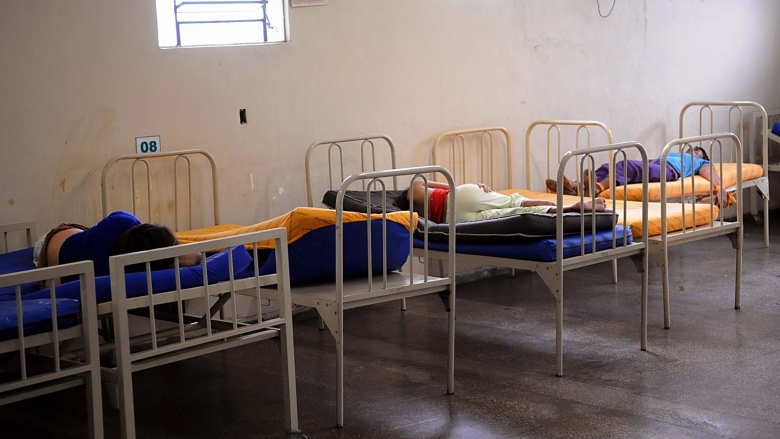A World Health Organization (WHO) video describes it as a black dog that follows you everywhere, does not let you sleep or eat well. This description had already been made famous by British statesman Winston Churchill. That black dog’s name is depression.
Depression is the most common mental illness in the world. In Latin America, 5% of the adult population suffers from it, but most neither seek – nor receive – treatment, according to the WHO.
In the worst of cases, depression can lead to suicide – an estimated 63,000 people kill themselves every year in the Americas. Even when it is less severe, depression can affect daily life, work and personal relationships.
The magnitude of the problem is evident: mental and neurological disorders account for almost a quarter of the disease burden in Latin America and the Caribbean. These range from depression and anxiety to bipolar disorder.
“These illnesses have an impact on the daily lives of individuals: their work, cognitive abilities, studies, family and social activities,” says Dr. José Miguel Uribe, a psychiatrist and World Bank consultant.
Loss of productivity
In addition to the impact on personal life, mental illness can also affect a country’s development given that it is a leading cause of disability. “Mental illness is a leading cause of reduced productivity nationally (at least in Colombia) and worldwide,” says Uribe.
“It is an issue that affects many people and has an important impact on productivity,” says Roberto Iunes, a World Bank economist. “Many people miss work and produce less.” Iunes says that people often talk about the impact of physical problems on productivity but rarely that of mental health.
People living in poverty have more limited access to adequate mental health care, thereby worsening the vicious cycle of inequality in Latin American countries. “There is a clear relationship between standard of living and common mental disorders,” says Paulo Rossi Menezes, a professor of medicine at the University of Sao Paulo.
The poor are at greater risk of suffering a mental illness such as depression because they face more difficulties in life and because they have less access to appropriate care.
Nevertheless, less than 2% of the health care budget in the region is allocated to mental health, according to the WHO. Throughout the world, the percentage of resources earmarked for mental health is insufficient to cover basic needs, according to Uribe.
In response, the World Bank, whose main mandate is economic development and poverty reduction, is working to include mental health on the development agenda and to encourage economic and health officials of member states to prioritize it.
Information against stigma
According to Uribe, there are several obstacles to proper mental health care. “The first is the stigma surrounding mental illnesses. This makes it much more difficult for people to seek help because they feel ashamed or are concerned about the treatments.”
This attitude may be partly due to a lack of information. “People have no information and this contributes to the obstacles to care,” says Menezes. “People do not know that what they are feeling could be what we call depression, or if they do recognize it, they may have a hard time telling others about it.”
Additionally, the mentally ill have long been victims of discrimination. Only recently have these individuals played a more visible role in advocating for their rights to health and social inclusion.
Because mental health is also a human rights issue, the World Bank’s SaluDerecho initiative supports mental health efforts in Latin America.
“We need to give mental health patients some sense of normalcy,” says Nieves Domínguez González, a physician and surgeon at the University of Santiago de Compostela in Spain and a former manager of the Galicia Health Service.
“People need to learn that these patients can lead a normal life, with certain circumstances,” she says. The Spanish expert says that in Galicia, for example, health officials used film as a tool. After showing a movie that touched on the subject of mental illness, a specialist would discuss the subject with the audience.
Other challenges are associated with the shortage of physicians with the experience necessary to treat mental illness. “There are not enough professionals,” says Uribe. “Moreover, health care systems have not traditionally prioritized mental health.”
Strengthening primary care
To address the problem, international organizations have proposed strategies such as strengthening primary care in health and mental health, according to Uribe. This means making services available near the people, in the communities, and also assuring that general medical staff are trained to recognize mental illnesses.
“A primary care team can resolve many common mental health problems,” he says. Coordination between primary care physicians and specialists is also important for referring more complex cases to the proper specialists.
Fortunately, things are changing in some Latin American countries. In Brazil, for example, while 20 or 30 years ago, the focus was mainly on serious mental illness and patients in psychiatric hospitals, it has now been expanded, according to Menezes.
“There was a major shift in the country’s mental health policy,” he says. “Our mental health policy is no longer based on hospitals, but on psychosocial service centers and the integration of mental health in primary and general health care.”
According to Menezes, while many challenges remain, efforts are underway to extend service access to people who may be suffering from less severe mental disorders, like most cases of depression.
The goal, say the experts, is to improve mental health care in the region and to ensure that more Latin Americans have the possibility of defeating that black dog that follows many of them everywhere.

